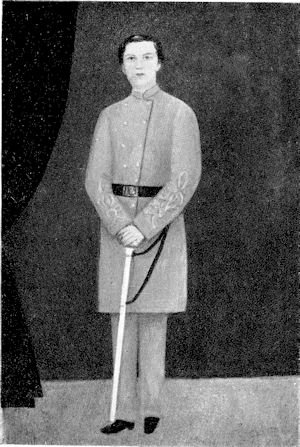March 14th, 1866.—Riding horse-back with My Soldier this afternoon I told him the incident at Goodwood and how gallantly Mr. Coolidge came to the rescue. I told him I had heard Mr. Coolidge was related to him and if that was so I wanted to know why he did not make friends with him? He looked very serious and I was beginning to fear I had hurt him in some unknown way.
At last he spoke, “I have never mentioned my cousin. Sidney Coolidge to you; he came to Florida to visit our family prior to the war. I, a school boy, just at the age to give the warmest admiration to a man of charm and ability such as he was. I loved my cousin Sidney and looked forward to the visit, which he had promised us at some future time.
“The war came on and during the whole four years of war, I was in the thickest of the fighting. After Gettysburg I was promoted and assigned to the Army of the West. One day I was sent to carry a dispatch for my general. Crossing the field of Chickamauga, I was hit by a. bullet; (the only time in all the years) it ploughed its way through hat and hair scorching as it went. I was stunned but soon recovered, delivered the dispatch and turned to go. An officer who knew me, laid his hand on my arm and said:
” ‘Your cousin, Colonel Coolidge, lies dead in that tent, don’t you want to go and look at him?’
“I was still faint from the shock of the bullet and I turned quickly away that he might not see my horror and distress. I did not see him, I could not bear it, but always, I have thanked a kind Providence that on this day I had not fired a single shot but had been on courier duty all day.
“Now, this young lieutenant you like so much, is probably a relative, indeed I am sure he is, but this is the way I feel about it; if the Confederates had been the victorious army and I had been occupying the conquered country, if, in fact, our positions could be reversed, I should look him up, claim the tie of blood and proffer the hand of friendship. As things stand, he is the conqueror, I am the conquered and if any advances are made they must come from him.”
“I am sorry,” I said when he closed. “Even if he does wear the blue, he is a kinsman worth claiming and I am sure you two would be congenial.” With that the subject was dropped, never to be resumed. He is a man of deep feeling, quiet and reticent, sincere and truthful but too proud to expose himself to a possible slight. The Southern Confederacy had no braver soldier than he. My brave Soldier in Gray!



